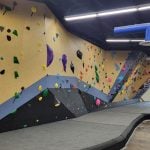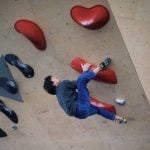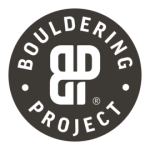
[Branded Content]
This post comes to you amidst uncertain times. Here at Venga, we’d like to offer our services to gyms however we can, whether that means getting your members set up with a home hangboard league while your gym is closed, or getting your community stoked about a league for when you reopen. Just shoot us a note if you’re interested.
Local competitions and leagues have been a part of our climbing gym communities since their very beginnings. From high drama for pro athletes to spicy chicken for routesetters and climbers, every competition has contributed a chapter in our shared history.
Still, the economics of big little comps is not always straightforward for organizers. Like other gym events, they take time and resources to put together, and it can be hard to determine the return on investment. When all is said and done, are local climbing competitions even worth it?
Here at Venga, we believe the answer to that question is yes. We all value community, fun and accessibility. Well, climbing gyms are bringing these values to life through their leagues and competitions. For us, the question is not whether to run them; the question is how to run them in a successful way. And multiple gyms across the country have been making that happen with Venga.

Accessibility in Providence
Gym burnout is real and can often lead to canceled memberships and poor attendance. Giving your climbers a purpose every time they come into the gym is a huge motivator. Sessions become more meaningful, attendance goes up and the community tightens. This type of engagement can be the difference between a lost membership and a converted lifelong climber.
Rock Spot Climbing (RSC) is a five-gym chain in New England that has been giving climbers a purpose through accessible competition. After trying out different formats throughout the years, RSC recently debuted a new league format at their Providence, Rhode Island, location.
The Community Climbing Comp (C3) boasts a unique “individual format” which supports a clever mix of accessibility and community. Different from single or multi-day events, C3 participants compete for free on their own time throughout a six-week period. Climbers are split into three divisions based on their skill level. At the end, everyone gathers for a community-oriented, comp-style finals event.
Rather than hire outside USAC setters and close their gym, the setters simply use a regular set for the finals comp. Participants are limited to the gym members who have been competing throughout the league. With no hot-shot climbers flying in to claim the prizes, glory and stoke stay accessible to local community members.

Community in Austin
Feeling embedded in the fabric of a strong and supportive community is the number one thing that will keep climbers coming back, time and time again. The more avenues your gym provides for members to meet and interact with one another and your staff, the better. Climbing leagues are especially powerful in that they help foster friendships and partnerships on the floor.
Austin Rock Gym (ARG) has been bringing their community together with a unique staff-centered climbing league. ARG recently piloted the concept at their facility in Austin, Texas. Managers, setters, coaches and front desk staff competed against one other using a handicapped scoring system (vMax) that enabled all abilities to compete fairly. Points were awarded relative to each staff member’s ability coming into the league.
ARG also showcased a live leaderboard on a monitor in the gym, which generated stoke among the climbers watching. Members would cheer on their staff members and take guesses on who might come out ahead. By the end of the league, the climbers at ARG grew closer to their staff―who were previously behind the desk or behind the wrench.

Fun in Boston
Every climber is different when it comes to competition. Some are highly competitive, others compete against friends, and the intrinsically motivated compete with themselves. Either way, competition adds a fun, healthy dose of pressure necessary to learn new skills, push past stubborn plateaus and get better. It’s no secret that getting better feels great (yay dopamine!). If your climbers feel good and are having fun, there’s no doubt they will keep coming back.
RSC South Boston has been helping climbers progress through fun competitions for years. In the Adult Boulder League of RSC, teams compete against each other one night per week for six weeks. The focus of the competitions is on community and fun, for all team members.
By charging a modest fee for sign-ups, RSC is able to offer prizes and staffing for the event. The best two climbs from each team member per night are eligible for points, with a maximum of six climbs per team. This ensures equal participation by all team members and―with four to five members per team―builds in some flexibility for members who miss a night. RSC also hands out bonus prizes for team spirit. On Thursday nights, you’ll find teammates cheering each other on and pushing themselves past their limit, week after week.
“You know, having something that is keeping track of your climbs―giving you a lot of feedback, giving you access to other climbers in the gym who are leaving their own comments―kind of gives new climbers this sort of entry point,” says Pete Sancianco, Director of Marketing at Rock Spot Climbing
“Knowing that the league was going on―and seeing everyone else on the [Venga] app―it was definitely a motivator to get to the gym and get those problems done,” confirmed one competitor of RSC’s Adult Boulder League.

Organizing a successful league in 30 minutes
What do these case studies have in common? All of these gyms leverage the Venga platform to organize and run their leagues. Venga offers the most robust league tools on the market. Let Venga handle registration, scoring, marketing and everything in between. Your climbers will receive a new engaging digital experience, with live leaderboards and an interactive app that lets them dig into all the juicy details; and you will receive a league that does all the heavy lifting for you.
“I was almost worried I wasn’t doing enough,” says Ben Burgess, owner of Rock Box Bouldering, which also uses the Venga app for its competitions.
With Venga, you can start organizing your league in less than 30 minutes. Here’s all you need to get started:
1.Setup & Format
You will have a few questions to consider at the start. What will the scoring format be? Will it be team based or individual? Should you split the league into divisions? Should you charge for the league? What days will work best and for how long will it run? How do we stop climbers from cheating? Should we offer prizes?
Depending on the league format, you may choose to either handicap your scoring or split climbers into divisions. The former will put everyone on an equal playing field and is great for leagues with teams; the latter works well for leagues with teams and large communities.
Keep in mind that each gym and community is different, so you’ll want to cater your experience accordingly. You might not get it right the first time, but have fun with it! Your members will appreciate your creativity.
2.Rules & Scoring
Whatever format you choose, climbers will need a way to keep track of their climbs. That means logging the grade, the wall, number of attempts, etc. Once you have gathered a fat stack of score sheets, you’ll need to tally up the points and consider any bonuses you need to add, or what to do with the occasional ringer who is climbing three grades outside their division. Luckily, there are programs and apps to help you do just that.

3.Technology
Managing leagues can quickly become a time drain for your team. If you’re sick of tallying up score cards and are looking for a better way to engage your league participants, technology can be a game changer. Here at Venga, we make it easy for your members to sign-up, create teams and automate scoring. We also give users live leaderboards to keep track of their standings and stay motivated. You’ll be able to spend more time engaging with your members rather than managing them.
4.Party/Finals Event (Optional)
The last thing you’ll need to consider is a cap to your league. How do you want to celebrate the weeks of hard work your members have put in? Some of our partners have chosen to throw a finals competition. For many participants, this might be their first time competing in or even attending a formal competition.
Finals can be a lot of work. Keep things simple and re-use your normal sets. If you’re not feeling a finals event, a party can be just as great. Use this opportunity to talk to your members about the league. What did they like? What did they not like? How could you improve the league for the next time?
Venga
Save yourself the time and energy and leave your gym’s next league up to the pros at Venga! Learn more or contact us now at www.vengaclimb.com.
.











